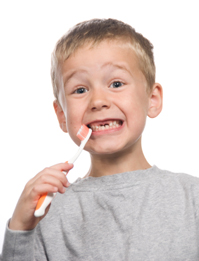North Dallas Pediatric Dentist
As you know, dentistry plays an extremely important role in a child’s life. Setting a standard of good oral hygiene can never begin too soon and plays a key role in the self image of an individual throughout a lifetime. Families with young children need to find a regular pediatric dentist that they can feel comfortable with. The selection of a children’s dentist should be formalized around the 3 1/2 to 4 years of age (preschool).
Our practice welcomes the pediatric dentistry specialization but realizes that the first few visits to the dentist are either a boring or frightening experience for most children. However, we take extra measures to make their visit as friendly and supportive an environment as possible. Our staff prides themselves on finding those smiles that help to calm the nerves of our small patients and their parents.
Treatment will only be carried out on the first visit if there is some urgency because of pain or infection. It will help if you explain to your child that we will be looking at their teeth and maybe polishing or taking pictures of them.
Baby teeth are an important function to your child’s oral health. These teeth perform a crucial role in chewing, speech development and help lead the way for secondary teeth.

Because pediatric dentistry involves the treatment of those whom you care most, your children, we continue to stay up on the latest & greatest dental technology. Our practice sees to it that he, as well as, his dental care staff pays extra special attention to the sterilization and infection control of all equipment used during the visit. In addition we do not use mercury containing amalgam fillings.
We are here to care for your child’s dental needs and that of your entire family. We are gifted in the art of pediatric dentistry and are dedicated to your child’s oral well-being and setting a standard of coolness with going to the dentist.
FAQ’s
When should I take my child to the dentist for the first check-up?
The general recommendation is to have your child evaluated by a dentist by their first birthday or when the first baby tooth erupts, whichever happens, sooner. However, your child should be established with a dentist no later than their fourth birthday. When arranging your child’s first dental check-up, be sure that you choose a practice that is experienced in working with pediatric patients and can calm any fears that a child may (understandably) have at the first few dental exams. We ease children into dental care by focusing the first appointment on visually inspecting the teeth, only performing treatments when it is necessary to address an urgent situation.
Are baby teeth that important to my child?
In short, yes! Your child’s baby teeth are designed to be placeholders for the permanent teeth until those teeth are ready to erupt. If the baby teeth are lost prematurely, then the permanent teeth may come in too soon, which can have a range of effects on the function and appearance of your child’s smile. It is just as important for you to take good care of your child’s baby teeth and have them see a dentist regularly as it is for maintaining permanent teeth.
How often does my child need to see the dentist?
Because children face the same oral health risks that their parents do, they should see their dentists with the same frequency – every six months for exams and cleanings. This will allow the dentist to closely monitor the development of their smiles and intervene should any issues emerge. Additionally, your child needs to have their teeth cleaned every six months to minimize the presence of potentially harmful oral bacteria.
What should I do if my child falls and knocks out a permanent tooth?
Your child should be seen as soon as possible in our office if a permanent tooth becomes dislodged, so call us immediately to arrange to come in. In the meantime, you can attempt to gently reinsert the tooth into the socket (while wearing medical gloves), if possible. Rinse the tooth first if it is dirty and avoid handling the tooth by its roots. Have your child bite down on sterile gauze for more stability. If the tooth cannot be re-inserted, then you can keep the tooth in a small container of saliva or milk and bring it with you to the office.
